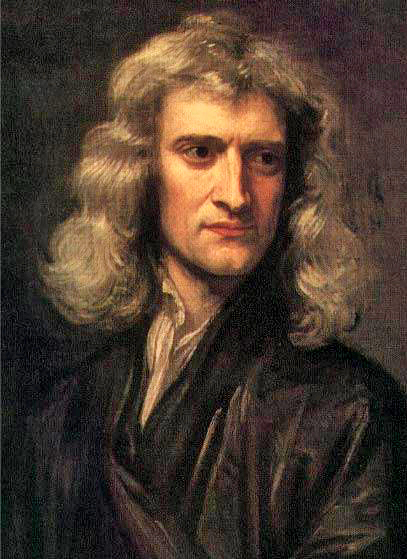Isaac Newton fue un físico, teólogo, inventor, alquimista y matemático inglés. Es autor de los Philosophiæ naturalis principia mathematica, más conocidos como los Principia, donde describe la ley de la gravitación universal y estableció las bases de la mecánica clásica mediante las leyes que llevan su nombre. Entre sus otros descubrimientos científicos destacan los trabajos sobre la naturaleza de la luz y la óptica , y en matemáticas, el desarrollo del cálculo infinitesimal.
Newton comparte con Gottfried Leibniz el crédito por el desarrollo del cálculo integral y diferencial, que utilizó para formular sus leyes de la física y astronomía. También contribuyó en otras áreas de las matemáticas, desarrollando el teorema del binomio y las fórmulas de Newton-Cotes.
Entre sus hallazgos científicos se encuentran el descubrimiento de que el espectro de color que se observa cuando la luz blanca pasa por un prisma es inherente a esa luz, en lugar de provenir del prisma ; su argumentación sobre la posibilidad de que la luz estuviera compuesta por partículas; su desarrollo de una ley de convección térmica, que describe la tasa de enfriamiento de los objetos expuestos al aire; sus estudios sobre la velocidad del sonido en el aire; y su propuesta de una teoría sobre el origen de las estrellas. Fue también un pionero de la mecánica de fluidos, estableciendo una ley sobre la viscosidad.
Newton fue el primero en demostrar que las leyes naturales que gobiernan el movimiento en la Tierra y las que gobiernan el movimiento de los cuerpos celestes son las mismas. Es, a menudo, calificado como el científico más grande de todos los tiempos, y su obra como la culminación de la revolución científica. El matemático y físico Joseph Louis Lagrange , dijo que «Newton fue el más grande genio que ha existido y también el más afortunado, dado que solo se puede encontrar una vez un sistema que rija el mundo».
Wikipedia
✵
4. enero 1643 – 31. marzo 1727
•
Otros nombres
Sir Isaac Newton
